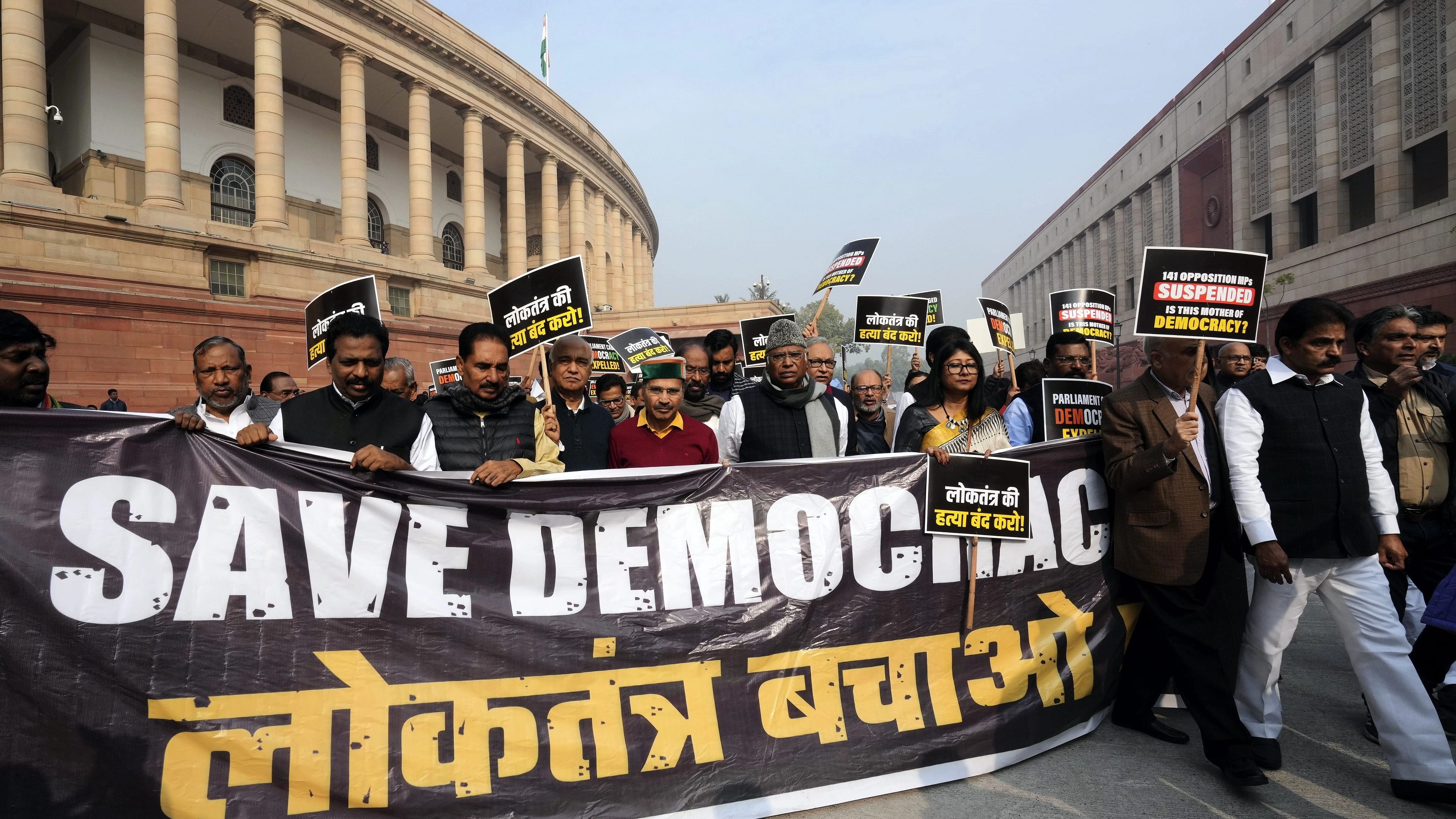
Leader of Opposition in the Rajya Sabha Mallikarjun Kharge with suspended opposition MPs during a protest over their suspension at Mahatma Gandhi statue amid the Winter session of Parliament, in New Delhi, Thursday, Dec. 21, 2023.
Credit: PTI Photo
The developments in Parliament last week may seem a nightmare for anyone concerned with sustaining the elementary aspects of a well-functioning, representative democracy.
On December 13, the 22nd anniversary of the attack on Parliament, there was another security breach. Two youths, Sagar Sharma and Manoranjan D, jumped into the Lok Sabha chamber from the public gallery, raised slogans and opened smoke canisters, disrupting the proceedings of the winter session.
The intention of the two youths was purportedly aimed at drawing attention to issues like rising unemployment and a decline in constitutional morality. Shouting patriotic slogans and citing Bhagat Singh as their inspiration, they stressed they were “anguished Indian youth, and not terrorists or fundamentalist conspirators”.
This incident did expose the serious security gaps in the nation’s most sacred institution. However, what ensued from that episode may trigger apprehension on the functioning of the country’s democracy. Over the past week, 146 opposition party MPs were suspended for the entire session. Surprisingly, BJP MP Pratap Simha, who is supposed to have facilitated the entry passes to the two youths, faced no consequences.
A few statements were made to the regional language press. But there has been no formal statement made in the House about the security lapse, or the mass suspension.This is a case of democracy in suspension that is unprecedented in magnitude.
The suspension of MPs diverges from incidents in the past, notably the 1989 suspension of 63 Lok Sabha members for a week, triggered by disputes over tabling the Justice Thakkar Commission's report on Indira Gandhi's assassination in 1984. This time, the members faced expulsion for the entire session.
One has to look at the recent history of Parliament to suspect that this “strategy of suspension” may be used to quash dissent. This theory of silencing critics through suspension is gaining ground because it echoes earlier instances, such as the 2020 suspension of eight Rajya Sabha MPs, protesting Farm Bills, and the 2017 suspension of six Congress MPs for protesting the denial of an adjournment motion on lynching incidents.
This winter session, in the absence of the 100 opposition MPs, the Lok Sabha has passed two highly controversial bills: the three Criminal Law bills which experts claim could bring in a “police state”, granting the government unbridled and unprecedented arbitrary powers, and the Telecommunications Bill, which many argue lays the groundwork for totalitarian control of the internet. Can this stand the ethical scrutiny in the absence of a sizeable number of MPs in the House?
In the Rajya Sabha, Chairman Jagdeep Dhankar's actions, including reprimands and expunging remarks, seem to undermine parliamentary dignity, deviating from past neutral precedents, set by officials like G.V. Mavalankar, M.A. Ayyangar, and Hukum Singh.
Remedial measures
It is interesting to recall an expulsion case in 1974. Haryana MLA Hardwari Lal faced expulsion from the State Assembly for criticising the then chief minister, Bansi Lal. He challenged this in the Punjab and Haryana High Court, which ruled in April 1977 that neither the Assembly nor Parliament can expel members, as it would amount to reconstitution of the House. The court emphasised that conduct issues be addressed through IPC provisions.This out-of-the-box judgment has not been questioned or upturned. But the issue continues to be alive.
In July 2019, the Rule Review Committee proposed automatic suspension for disruptive members in Parliament. A 2016 Vidhi Centre report suggested a Parliamentary Disruptions Index (PDI) and a Productivity Meter, mirroring UK norms. It proposed a "code of conduct" for members, in line with UK and US models, emphasising Opposition-led debates and adopting the UK's Prime Minister's Question Time format. The report noted the prime minister’s absence during sessions as a disruption factor, recommending posing questions within parliamentary rules to emulate the UK's engagement practice. It also highlighted presiding officers' roles, expressing concerns about partisanship.
A Farce?
Many argue that India, as it currently stands for all intents and purposes, is not a parliamentary democracy anymore. In a single audacious move, the ruling regime has essentially ensured that over 15 crore voters from the Lok Sabha and 19 crore voters from the Rajya Sabha are left without a voice. If issues like security breach of Parliament cannot be discussed in Parliament itself, what good is Parliament?
All the cherished values of democracy, such as Freedom of speech, liberty, fair and equitable representation, accountability and transparency have been rendered meaningless. What is the role of the worthy presiding officers in upholding these values? Doesn’t their failure adversely affect the garima (dignity) of the Houses?
Moreover, without the Opposition members, what is left of the institution of Parliament? The demise of parliamentary democracy will mean the demise of India as we knew it. In this sombre moment, I can only turn to Ghalib to express the gloom in my heart: Rakhiyo Ghalib mujhe iss talkh-nawai main maaf Aaj kuchh dard mere dil mein siwa hota hai (If Ghalib sings in a bitter strain, forgive him; Today pain stabs more keenly at his heart).
The writer is former Chief Election Commissioner of India and author of India’s Experiment with Democracy-the Life of a Nation through its Elections.